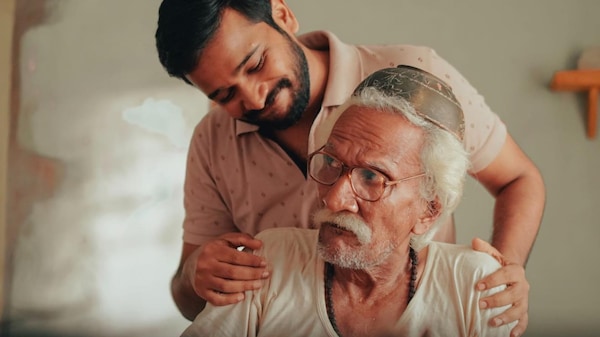Falimy movie review: Basil Joseph’s dysfunctional family drama works because of the humour and relatability
The dysfunctional family aspect of Falimy works to a large part, due to the performances and relatable situations, but the travel aspect offers nothing new

Last Updated: 02.45 PM, Nov 17, 2023
Falimy story: After the engagement ceremony of Anu (Basil Joseph) is disrupted, in a spur-of-the-moment reaction, he decides to fulfill his grandfather's long-time wish of visiting Varanasi. While his parents hesitantly agree to accompany him and his grandfather, his young brother has no such reluctance. But the trip from Thiruvananthapuram to Varanasi was never going to be smooth - not when all five members have a stubborn mind of their own.
Falimy review: There haven't been many full-length road movies in Malayalam, and the ones that have come out, usually fall into the coming-of-age genre. So, debutant filmmaker Nithish Sahadev’s Falimy promised a fresh combination of a travel film about a dysfunctional family. But does it deliver? Partly, yes - the dysfunctional family aspect works to a large part, aided by the actors’ performances and relatable situations, but the travel part doesn't really offer anything new.
The film starts off with its protagonist Anu (Basil Joseph), who is shackled by the debts of his father Chandran (Jagadish) and further faces pressure to get married, but can’t really find the right match. Finally, when he does, his engagement is disrupted, frustrating him further and blaming his family, which also comprises his mother, a younger brother who aspires to get away from and go to the UK and his grandfather, who yearns to visit Varanasi. In a fit of anger, Anu agrees to fulfill his grandfather's wish and the others - one after the other - join the duo in the journey. But given how disconnected they are with each other and also to the common goal of reaching Varanasi together, the plans go astray even before they reach the destination.
Director Nithish and co-scriptwriter Sanjo Joseph get the dysfunctional family right - precisely, the relationship between the sons and the father. Jagadish’s character Chandran, who prioritises himself over the needs of his family, is often at loggerheads with Anu, who feels bogged down for carrying the weight of his family's financial burden. This is also why the scene where the two (mostly Anu) open up helps bridge the gap between them and also serves as a mirror to many such father-son relationships, where the father’s detachment can be perceived as apathetic by the son.
Another scene that also stands out, for its writing and craft, is when the family waits for the grandfather, who goes missing and harbours hope of finding him at a lodge in Varanasi. The scene works both for its comedic elements but also for being deeply-layered as it shows how sometimes a simple word or action can melt the years of bitterness. This is further accentuated by Anu’s character calling out for his father in the middle of a crowded alley in Varanasi.
That said, the travel portions in the movie are a letdown, save for the scene at a railway station where the family gets stranded. It follows a series of mishaps that are sometimes enjoyable but largely predictable and hence, inconsistent. One also gets a feeling that the second half of the film is rushed, but that's not necessarily a bad thing because towards the end, the film does run out of steam.
Basil Joseph is excellent as Anu, and his frustrations are what actually elevates the humour of the film. Jagadish as the detached father shows why he can handle any role with ease; the restraint of never really bursting out at his son even when Chandran wants to and the relief he feels towards the end are all brought out perfectly. Manju Pillai, Sandeep Pradeep and Meenaraj, who plays the grandfather, do their parts well - but you would wish their characters too were as explored as the father and elder son’s.
Falimy verdict: Falimy works mostly because of its humour - derived from relatable situations in middle-class households - where a journey with a family isn't often a priority for everyone who is part of the trip. But at less than 2 hours and 7 minutes, it’s a breezy watch in theatres because certain aspects of the film are sure to click with everyone.
Subscribe to our newsletter for top content, delivered fast.

